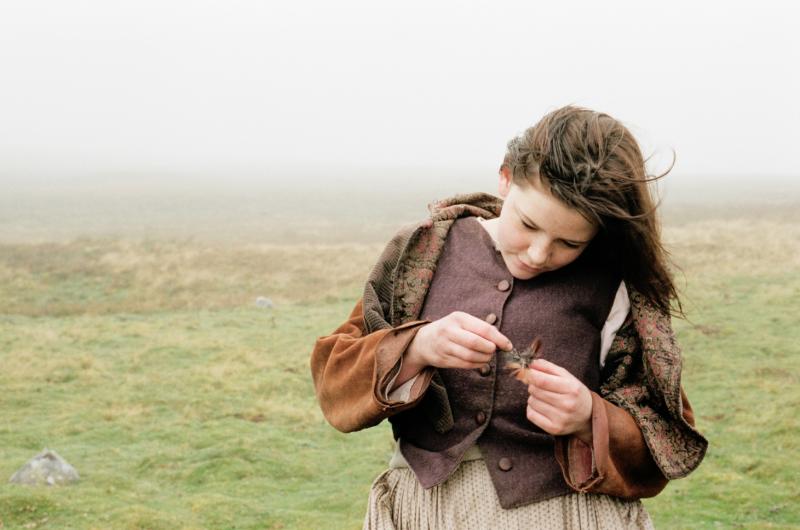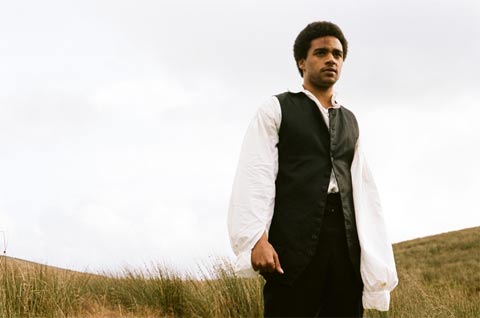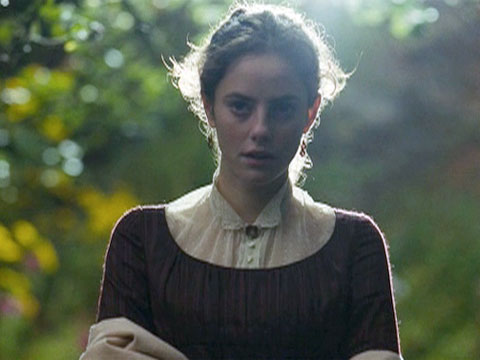Wuthering Heights | reviews, news & interviews
Wuthering Heights
Wuthering Heights
A modern take on a Brontë classic can't quite muster the passion of the original

You can forget “I am Heathcliff”. And abandon hope of “I cannot live without my soul” and “I love my murderer” while you’re at it. Andrea Arnold’s newest addition to the canon of Wuthering Heights adaptations is the story flayed so raw you can see bone. Jettisoning such fripperies as dialogue, fixed cameras and even for the most part avoiding professional actors, she takes period drama by the wing-collared throat and throttles it with gonzo relish.
From Laurence Olivier and Merle Oberon RSC-ing all over the politest Yorkshire moors imaginable, to the earnestly contemporary take of a 2003 MTV made-for-television adaptation (featuring Katherine Heigl, which rather says it all), cinema has run the gamut of approaches to Emily Brontë’s windswept classic. Director Andrea Arnold (Fish Tank, Red Road) makes a strong case, however, for returning to the plundered literary treasure chest. Rather than abandoning the cruel, urban sensibility of her previous features, she sustains its bolshy gaze, making little or no allowance for the conventions of costume drama.
Language – the fist with which Brontë makes her case – hangs uselessly, like a withered limb
It’s a good fit. While an Arnold take on Jane Eyre or Villette would make no sense (though a re-think of Austen’s social satire on her terms might be rather bracing), in Wuthering Heights Arnold recognises a dramatic kinship, bringing to the fore a frenzy that is only barely contained in the novel. Her camera roams with hand-held stumblings, uncovering memories strewn like the fleshy remnants of battle across the moors. It lingers close and long on beetles and birds, the animal life whose strivings and labourings give little more pause to the wind than those of the Earnshaws give the Fates. No soundtrack here (Mumford & Sons’ intrusion into the very last frame is a serious misstep), just the physical force of the gale pushing its way into the ear. Rain, mud and excrement duly play their supporting roles, forcing themselves across the porous boundaries of the domestic interior, the heath rejecting the tumorous human growth of the Heights.
 Brontë’s coy references to Heathcliff as a “gypsy” and a “Lascar” are translated, reasonably enough, by Arnold into a black hero, whose Liverpool origins carry with them the suggestion of slavery. “He’s not my brother, he’s a nigger,” rails Hindley (Lee Shaw), and the sense of Heathcliff as outsider emerges with contemporary clarity.
Brontë’s coy references to Heathcliff as a “gypsy” and a “Lascar” are translated, reasonably enough, by Arnold into a black hero, whose Liverpool origins carry with them the suggestion of slavery. “He’s not my brother, he’s a nigger,” rails Hindley (Lee Shaw), and the sense of Heathcliff as outsider emerges with contemporary clarity.
At its best in the realm of the physical – the young Cathy (Shannon) licks the bloody traces of a beating from Heathcliff’s back, the two break free from a baptism to run back and bathe in the sodden atheism of the heath – the novel’s early years enjoy vivid and unusually protracted treatment. Both Beer and the inscrutable Solomon Glave (as young Heathcliff) put their lack of experience to good use, amply filling the silences where dialogue should be. The real problems come later when James Howson (pictured above) and Skins’ Kaya Scodelario take their places.
 “Fuck you all, you cunts,” (addressed to the assembled Linton family) is about as close to a complete sentence as the adult Heathcliff is permitted to get. All the charged glances and panting, gasping unspokens in the world can’t hope to compensate for what we don’t get here. Language – the fist with which Brontë makes her case – hangs uselessly, like a withered limb. Scodelario (pictured left) disappoints with a rather passive performance, generating little connection with Howson, and not even their mutual good looks can carry the film’s ending from True Romance into tragedy.
“Fuck you all, you cunts,” (addressed to the assembled Linton family) is about as close to a complete sentence as the adult Heathcliff is permitted to get. All the charged glances and panting, gasping unspokens in the world can’t hope to compensate for what we don’t get here. Language – the fist with which Brontë makes her case – hangs uselessly, like a withered limb. Scodelario (pictured left) disappoints with a rather passive performance, generating little connection with Howson, and not even their mutual good looks can carry the film’s ending from True Romance into tragedy.
There are few current directors better placed than Arnold to make a go of Brontë's novel, to justify the retelling of the too-familiar tale. There’s innovation, certainly, but also – rather better concealed – an awful lot of authenticity here. Perhaps the greatest compliment I can pay Arnold is to say that the film’s faults are almost all those of the novel itself. Her Wuthering Heights is a film of unwavering conviction. Excess, irrationality and the blunt pain of being human all assault the viewer on cue. With the film over two hours long however, concision is one skill she would have done well to learn from Brontë.
Watch the trailer to Wuthering Heights
rating
Explore topics
Share this article
The future of Arts Journalism
You can stop theartsdesk.com closing!
We urgently need financing to survive. Our fundraising drive has thus far raised £49,000 but we need to reach £100,000 or we will be forced to close. Please contribute here: https://gofund.me/c3f6033d
And if you can forward this information to anyone who might assist, we’d be grateful.

Subscribe to theartsdesk.com
Thank you for continuing to read our work on theartsdesk.com. For unlimited access to every article in its entirety, including our archive of more than 15,000 pieces, we're asking for £5 per month or £40 per year. We feel it's a very good deal, and hope you do too.
To take a subscription now simply click here.
And if you're looking for that extra gift for a friend or family member, why not treat them to a theartsdesk.com gift subscription?
more Film
 Can I get a Witness? review - time to die before you get old
Ann Marie Fleming directs Sandra Oh in dystopian fantasy that fails to ignite
Can I get a Witness? review - time to die before you get old
Ann Marie Fleming directs Sandra Oh in dystopian fantasy that fails to ignite
 Happyend review - the kids are never alright
In this futuristic blackboard jungle everything is a bit too manicured
Happyend review - the kids are never alright
In this futuristic blackboard jungle everything is a bit too manicured
 Robert Redford (1936-2025)
The star was more admired within the screen trade than by the critics
Robert Redford (1936-2025)
The star was more admired within the screen trade than by the critics
 Blu-ray: The Sons of Great Bear
DEFA's first 'Red Western': a revisionist take on colonial expansion
Blu-ray: The Sons of Great Bear
DEFA's first 'Red Western': a revisionist take on colonial expansion
 Spinal Tap II: The End Continues review - comedy rock band fails to revive past glories
Belated satirical sequel runs out of gas
Spinal Tap II: The End Continues review - comedy rock band fails to revive past glories
Belated satirical sequel runs out of gas
 Downton Abbey: The Grand Finale review - an attemptedly elegiac final chapter haunted by its past
Noel Coward is a welcome visitor to the insular world of the hit series
Downton Abbey: The Grand Finale review - an attemptedly elegiac final chapter haunted by its past
Noel Coward is a welcome visitor to the insular world of the hit series
 Islands review - sunshine noir serves an ace
Sam Riley is the holiday resort tennis pro in over his head
Islands review - sunshine noir serves an ace
Sam Riley is the holiday resort tennis pro in over his head
 theartsdesk Q&A: actor Sam Riley on playing a washed-up loner in the thriller 'Islands'
The actor discusses his love of self-destructive characters and the problem with fame
theartsdesk Q&A: actor Sam Riley on playing a washed-up loner in the thriller 'Islands'
The actor discusses his love of self-destructive characters and the problem with fame
 Honey Don’t! review - film noir in the bright sun
A Coen brother with a blood-simple gumshoe caper
Honey Don’t! review - film noir in the bright sun
A Coen brother with a blood-simple gumshoe caper
 The Courageous review - Ophélia Kolb excels as a single mother on the edge
Jasmin Gordon's directorial debut features strong performances but leaves too much unexplained
The Courageous review - Ophélia Kolb excels as a single mother on the edge
Jasmin Gordon's directorial debut features strong performances but leaves too much unexplained
 Blu-ray: The Graduate
Post #MeToo, can Mike Nichols' second feature still lay claim to Classic Film status?
Blu-ray: The Graduate
Post #MeToo, can Mike Nichols' second feature still lay claim to Classic Film status?

Add comment